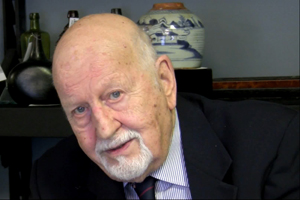Statement to the Society for Historical Archaeology about Ethics and Odyssey Marine Exploration
A Video Commentary by Ivor Noël Hume
| See Commentary | About Ivor Noël Hume | Web Links |
In this prepared video statement recorded at the Tampa, Florida, laboratory of Odyssey Marine Exporation, Inc. (OME), Ivor Noël Hume argues that the Society for Historical Archaeology should revise its code of ethics to encourage those who do good work, such as MNE in his opinion, to participate in the archaeological enterprise. He expresses that it is perfectly reasonable and ethical for an organization to realize a financial return from the sale of high-value duplicate artifacts such as gold coins while at the same time recovering and publishing the archaeological data which the artifacts and features of the site represent. In his view, this business model is effectively the only realistic method for affordable deep-water excavation. This video was prepared for and shown at the Ethics Panel meeting at the annual conference of the Society for Historical Archaeology in Toronto, Ontario, Canada, in January 2014.
Comments requested:
As the sale of objects recovered from archaeological sites is considered permissible in specific circumstances by some archaeologists and never permissible by others, we present this video commentary to promote discussion of the subject. Archaeological Legacy Institute in presenting this video does not take a position on the matter, but we do invite interested persons and organizations to weigh in and express their opinions on it. We encourage you to send your comments by email to This email address is being protected from spambots. You need JavaScript enabled to view it..
Use this link to see the comments as we compile them: Coming Soon.
To see the interview, click on the bandwidth for your player below.

Ivor Noël Hume
Ivor Noël Hume was born and educated in Britain, but went on to found the discipline of historical archaeology in the United States, where he often is called the “Father of Historical Archaeology.” Ivor Noël Hume was born in London (U.K) in 1927 and was educated at Framlingham College and St. Lawrence College before volunteering for the Indian Army in 1944. On leaving the military and wanting to be a playwright, he spent four years in the theater before joining the staff of London’s Guildhall Museum in 1949 where he worked with historical archaeology pioneer Adrian Oswald. He served as the Corporation of London’s rescue archaeologist until 1957 when he took over the archaeological department at Colonial Williamsburg in Virginia. He held the same post under several names until retiring in 1987. During his tenure there, he was a founding director of the Society for Historical Archaeology and effectively established the discipline of historical archaeology in the United States, where he often is called the “Father of Historical Archaeology.” A writer of plays, film scripts and books, he lives in Williamsburg where he continues writing and espousing controversial yet worthwhile causes such as the challenged competence of Odyssey Marine Exploration. He serves alongside Margaret Rule (of Mary Rose fame) on Lord Longfield’s advisory committee for the archaeology of the British Navy’s Victory, lost in a storm in 1744.
Web links:
Anthropology Field Notes 6: Shipwrecks - with Odyssey Marine Exploration
Cultural Artifacts and Trade Goods: The Odyssey Model, by Ellen C. Gerth (YouTube video, 2011)
Deaccessioning Archaeological Collections and Selling Artifacts, by Paul F. Johnston (Advisory Council on Underwater Archaeology)
Institute of Nautical Archaeology
International Journal of Historical Archaeology (Springer)
Ivor Noël Hume (Wikipedia)
The”Other” Meaning of Value in Archaeology: The Uncomfortable Topics of Money, Looting, and Artifacts of Questionable Origin, by Richard M. Pettigrew and Sanchita Balachandran, in Archaeology in Society: Its Relevance in the Modern World, ed. by M Rockman and J. Flatman (Springer)
Society for Historical Archaeology
Underwater Archaeology (Wikipedia)
